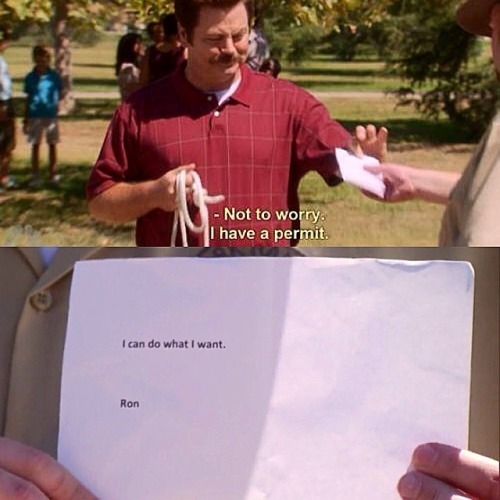
For argument sake, let’s propose the following. I have passed a new law saying:
- I am the government.
- I can drive whatever speed I like.
If a cop pulls me over for speeding, I will pull out my law book and quote to him, “I can drive whatever speed I like.” Of course, he’d have a good chuckle and write me a ticket. He has a gun, and just as importantly, the willingness to kill me.
The knee jerk reaction of 99.9% of people reading that would say my government is not valid. But why? Why is the state of Colorado law valid, and my government and law invalid?
Isn’t making up a new government exactly what the state of Colorado (or whatever government at whatever level) has done? A group of guys got together and said, “We are the new government.”
Then, they say something like, “Let’s write a consitution! The constitution will define our territory and we’ll make up out of thin air a process for new laws to be passed. Somewhere in the law or the constitution, we’re going to have to say that we have the right to apply our laws to the people within our boundaries. If someone comes along and asks whether we have the right to do this, we’re going to be able to quote to them from our laws saying that we do have the right.”
So, they’d say the law applies, because the law says it applies. This is circular reasoning, and isn’t a valid answer. If I said Islam is true because the Quran says so, you’d say that’s circular, and you’d be right to reject my answer.
I’ll put forth a few devil’s advocate answers to the question about why the government of Colorado laws might be valid.
The laws of the government of Colorado are valid because:
- They control the territory defined as Colorado.
- The government has been in existence in its current form since 1876.
- Anyone who enters the territory of Colorado agrees to abide by the law or face the consequences.
- Government agents have guns and are more than willing to use them. They rule by force.
- The Bible says we should obey the civil magistrates (Romans 13:1-7).
Numbers 1 and 4 are really the same. Forcing or threatening people doesn’t really make laws or a government valid, though it can be very effective.
Number 2 is not really a valid answer. It’s possible that the government has been invalid since its inception, or it has become invalid at some point. So, 1, 2 and 4 aren’t good answers.
Number 3 is a little bit more interesting. At least it adds a layer for us to peel away. There are people in Colorado who don’t agree to submit to the laws of Colorado. (If none of the other five million, there is at least me.) Why does the law apply to those who don’t agree to submit to Colorado law? And you’re back to the original question. Answer number 3 is just fluff.
Number 5 is really the only answer that would come close to being a good answer. However, if you’re going to claim number 5, you’d have to see whether the government qualifies as being valid by the standard of Scripture. I’ll tell you that it fails miserably.
This answer leads to a conundrum for government, because they explicitly reject that they might rule by biblical standards. They have rejected the Bible and Christianity as possible sources of guidance for government. THEY have rejected the only possible reason for their validity.
The only valid government is one that enforces God’s law as prescribed in God’s law. If they rule by God’s law, then they have God’s blessing in forcing people to do certain very limited things.
While I may not have covered every possible response to the question of why the government of Colorado is valid, I assure you there are no valid answers other than the biblical answer.
My made-up government, consisting of one citizen, is more valid than the state of Colorado, assuming I adopt God’s laws. They have no God-given or moral authority. All they have is the threat of force.
Oh, good news, I just made my wife and kids citizens as well, so now my government has 5 citizens. Care to join me? You might want to check out what God’s law says, but it is beautiful.